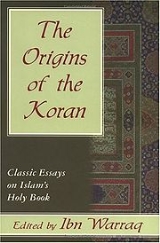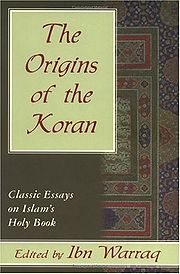
Origins of the Koran
Encyclopedia

The Origins of The Koran: Classic Essays on Islam’s Holy Book, is a 1998 book edited by secularist author Ibn Warraq
Ibn Warraq
Ibn Warraq is the pen name of a polemical author of Pakistani origin who is critical of Islam, and who founded the Institute for the Secularisation of Islamic Society . He is a senior research fellow at the Center for Inquiry focusing on Qur'anic criticism...
. It contains a collection of 13 critical studies of the Qur'an
Qur'an
The Quran , also transliterated Qur'an, Koran, Alcoran, Qur’ān, Coran, Kuran, and al-Qur’ān, is the central religious text of Islam, which Muslims consider the verbatim word of God . It is regarded widely as the finest piece of literature in the Arabic language...
written over the past two centuries by historians and scholars of the Middle East Ibn Warraq
Ibn Warraq
Ibn Warraq is the pen name of a polemical author of Pakistani origin who is critical of Islam, and who founded the Institute for the Secularisation of Islamic Society . He is a senior research fellow at the Center for Inquiry focusing on Qur'anic criticism...
, Theodor Nöldeke
Theodor Nöldeke
Theodor Nöldeke was a German Semitic scholar, who was born in Harburg and studied in Göttingen, Vienna, Leiden and Berlin....
, Leone Caetani
Leone Caetani
Leone Caetani , Duke of Sermoneta , was an Italian scholar, politician and historian of the Middle-East....
, Alphonse Mingana
Alphonse Mingana
Alphonse Mingana; was an Assyrian theologian, historian, Syriacist, orientalist and a former priest who is best known for collecting and preserving the Mingana Collection of ancient Middle Eastern manuscripts at Birmingham...
, Arthur Jeffery
Arthur Jeffery
Arthur Jeffery was a Protestant Australian professor of Semitic languages from 1921 at the School of Oriental Studies in Cairo, and from 1938 until his death jointly at Columbia University and Union Theological Seminary in New York City...
, David Samuel Margoliouth
David Samuel Margoliouth
David Samuel Margoliouth was an orientalist. He was briefly active as a priest in the Church of England...
, Abraham Geiger
Abraham Geiger
Abraham Geiger was a German rabbi and scholar who led the founding of Reform Judaism...
, William St. Clair Tisdall
William St. Clair Tisdall
William St. Clair Tisdall was a British historian and philologist who served as the Secretary of the Church of England's Missionary Society in Isfahan, Persia....
, Charles Cutler Torrey
Charles Cutler Torrey
Charles Cutler Torrey was an American historian, archeologist and scholar who presented manuscripturial evidence to support alternate views on Christian and Islamic religious sources and origins...
and Andrew Rippin
Andrew Rippin
Andrew Lawrence Rippin is a Canadian scholar of Islam.Rippin is Professor of History and Dean of the Faculty of Humanities at the University of Victoria, British Columbia, Canada...
.
The book examines widely held beliefs about the historical origins and sources of the Islamic holy book. It challenges the notion that the Qur'an
Qur'an
The Quran , also transliterated Qur'an, Koran, Alcoran, Qur’ān, Coran, Kuran, and al-Qur’ān, is the central religious text of Islam, which Muslims consider the verbatim word of God . It is regarded widely as the finest piece of literature in the Arabic language...
is error free, a view held by Muslims. Divided into four parts, the book presents an examination of the Qur'an. After an introduction in Part One, Part Two focuses on the difficulty, perceived by the authors, of establishing a reliable Qur'anic text, while Part Three claims to detail the Jewish, Christian
Christian
A Christian is a person who adheres to Christianity, an Abrahamic, monotheistic religion based on the life and teachings of Jesus of Nazareth as recorded in the Canonical gospels and the letters of the New Testament...
, and Zoroastrian sources of the Qur'an. Part Four attempts to disprove the historical reliability of the earliest Islamic sources.
Reviews
Herbert BergHerbert Berg
Herbert Berg, a scholar of religion, was trained at the University of Toronto's Centre for the Study of Religion in the late 1980s and early 1990s; he is a Professor in the Department of Philosophy and Religion, at the University of North Carolina at Wilmington and is the interim Director of the...
in his review from the Bulletin of the School of Oriental and African Studies summarized the essays lauding the inclusion of the essay by Theodor Nöldeke while panning the inclusion of William St. Clair Tisdall's as "not a particularly scholarly essay". He concluded "[i]t seems that Ibn Warraq has included some of the essays not on the basis of their scholarly value or their status as 'classics', but rather on the basis of their hostility to Islam. This does not necessarily diminish the value of the collection, but the reader should be aware that this collection does not fully represent classic scholarship on the Quran."
François de Blois criticized Ibn Warraq's work for including the essay by St. Clair Tisdall describing it as a "shoddy piece of missionary propaganda" and the "worst" among the essays of the book. De Blois also indicated that there are "quite a few mistakes in the spelling of both of Arabic and of European languages" and added that "the fact that the piece of Qur'anic calligraphy
Islamic calligraphy
Islamic calligraphy, colloquially known as Perso-Arabic calligraphy, is the artistic practice of handwriting, or calligraphy, and by extension, of bookmaking, in the lands sharing a common Islamic cultural heritage. This art form is based on the Arabic script, which for a long time was used by all...
reproduced on the front cover has been printed up-side down is not, presumably, an intentional insult to the editor's former co-religionists".
Christopher Melchert
Christopher Melchert
Christopher Melchert is an American non-Muslim Islamic scholar, specialising in Islamic movements and institutions, ninth to tenth centuries C.E. He is University Lecturer in Arabic and Islam at the University of Oxford's Oriental Institute, and is Fellow in Arabic at Pembroke College,...
, a professor at the University of Oxford, said that the collection offered "a fair impression of European Qur’an studies in the first half of the twentieth century" but also believes that the sources that Warraq cites are better to be read first-hand.
Todd Lawson said regarding the book that "arrogance and amateurish assumptions abound; and all is sounded in the key of gormless hysteria...It must be said that it undoubtedly demonstrates the editor's diligence and industry in finding churlish things to say about the Qur'an in English. It is difficult to recommend this production, except perhaps for antiquarian interests and the archaeology of the study of Islam."

